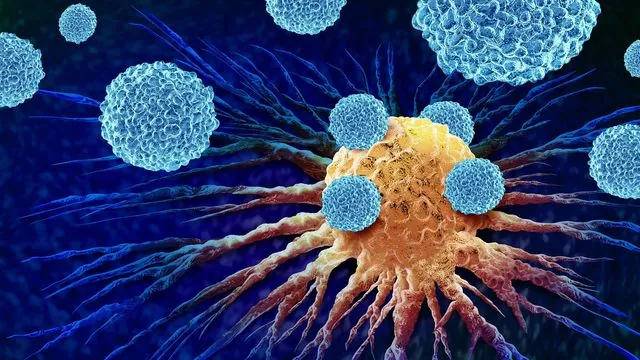
Groundbreaking Discovery: CAR-T "Memory" Cells Could Revolutionize Cancer Treatment
2025-01-03
Author: Nur
Groundbreaking Discovery in CAR-T Cell Research
In a remarkable breakthrough, researchers at the University of Colorado Anschutz Medical Campus have unveiled that certain engineered CAR-T cells, designed to battle cancer and other ailments, possess an exceptional memory of previous encounters with pathogens. This revolutionary finding paves the way for more precise and targeted cancer treatments, enhancing the effectiveness of CAR-T cell therapies.
The Study and Its Findings
The study, featured in the esteemed journal Nature Immunology, specifically examined chimeric antigen receptor (CAR)-T cells, which have proven to be especially effective in combating cancers like leukemia and lymphoma. In the CAR-T process, T cells—an integral component of the immune system—are extracted from the patient’s blood, modified to specifically target malignant cells, and subsequently reinfused back into the patient.
Researchers discovered that a subset of these CAR-T cells has retained long-lasting memories. Even following an extensive manufacturing procedure intended to introduce CAR into the cells, those that previously interacted with specific antigens exhibited markedly different behavioral patterns compared to those that had never encountered such antigens.
Expert Insight
Dr. Terry Fry, a leading figure in the study and a prominent medical professor at the University of Colorado, emphasized the uniqueness of CAR-T cell products, stating, 'Unlike most drugs, CAR-T cell products are not uniform. We know that variability exists, but the nature of that variability is only beginning to be understood. The surprising aspect was the degree to which prior interactions with antigens were durably imprinted on the cells.'
Balancing Efficacy and Exhaustion
Although these 'memory cells' demonstrated rapid efficacy in killing cancer cells, they exhibited a tendency to become exhausted more quickly and reproduced at a slower rate, thus raising concerns about potential cancer relapses. Conversely, the study also unveiled that 'naïve' T cells, which lack prior antigen experiences, showed remarkable disease-fighting capabilities, including robust expansion and an enhanced resistance to exhaustion.
Gene Targets for Optimization
Through comparative analysis, researchers pinpointed specific gene targets, such as RUNX2, which could be manipulated to optimize cell functions and improve treatment outcomes. When RUNX2 was introduced to naïve T cells, they not only demonstrated increased longevity but also a significant capacity to combat cancer without succumbing to early fatigue.
Transition from Mice to Humans
The research initially utilized mouse models before transitioning to human cells, revealing that T cells from vaccinated individuals had evolved after interacting with vaccine antigens. This encounter enabled them to respond effectively against leukemia cells, albeit at the cost of quicker exhaustion when compared to naïve T cells.
Future Directions and Conclusions
Dr. Fry noted, 'There was this balance dictated by the prior history of the cell. If you added RUNX2 to a naïve cell, you could make it kill cancer a little bit better.' The researchers also amassed a comprehensive data set containing various proteins to explore, alongside RUNX2, for potential therapeutic application.
This groundbreaking research opens the door to the engineering of more precise CAR-T cells, aimed at enhancing their cancer-targeting capabilities while minimizing debilitating side effects often associated with current therapies, such as severe inflammatory responses.
The authors conclude, 'Understanding these differences can guide the development of approaches to rationally manipulate specific cellular attributes. Further exploration of RUNX2's role in limiting exhaustion, particularly in solid tumor contexts, is essential, as exhaustion significantly curtails anti-tumor T cell responses.'
As the field of cancer therapy continues to innovate, this study may serve as a pivotal stepping stone towards more effective strategies in combating the disease. Watch this space for more updates on the evolving landscape of CAR-T technology!

 Brasil (PT)
Brasil (PT)
 Canada (EN)
Canada (EN)
 Chile (ES)
Chile (ES)
 Česko (CS)
Česko (CS)
 대한민국 (KO)
대한민국 (KO)
 España (ES)
España (ES)
 France (FR)
France (FR)
 Hong Kong (EN)
Hong Kong (EN)
 Italia (IT)
Italia (IT)
 日本 (JA)
日本 (JA)
 Magyarország (HU)
Magyarország (HU)
 Norge (NO)
Norge (NO)
 Polska (PL)
Polska (PL)
 Schweiz (DE)
Schweiz (DE)
 Singapore (EN)
Singapore (EN)
 Sverige (SV)
Sverige (SV)
 Suomi (FI)
Suomi (FI)
 Türkiye (TR)
Türkiye (TR)
 الإمارات العربية المتحدة (AR)
الإمارات العربية المتحدة (AR)